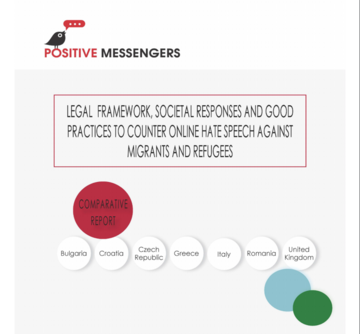
The project ‘Coalition of Positive Messengers to Counter Online Hate Speech’ , co-funded by the European Commission, aims at: raising awareness; sharing best practices to reduce incitement to hatred online; providing consistent data on online hate speech against migrants and refugees. It has been implemented since 2016 in 7 countries: Bulgaria (lead country), Croatia, Czech Republic, Greece, Italy, Romania, United Kingdom.
The report “Legal framework, societal responses and good practices to counter online hate speech against migrants and refugees” is one of the outcomes of the project. Given the lack of coherent statistical information regarding hate speech and/or hate crimes in the seven countries examined, civil society organizations have carried out most of such work. The available literature outline several correlations between increased hate speech and:
- increased broadband connection
- increased migrant flows
- national incidents, such as terrorist attacks
- pre-electoral campaigns targeting historical marginalized groups
- worsened economic situation
- worsened media landscape
Despite proper legislative frameworks to countering hate speech are in place in most of the project countries, they are rarely implemented. For instance, all of the studied countries have transposed the provisions of the Audiovisual Media Services (AMSD) which prohibit content including any incitement to hatred based on race, sex, religion or nationality; however, sanctions are often ineffective so that “most country reports point out that the media contributes to spreading xenophobia”. The development of mobile apps or web solutions; information literacy projects; counter-narratives; support to victims; advocacy campaigns are some of the initiatives brought about by grassroots organizations in the seven countries to address the issue. Ten final recommendations highlight the need of law enforcement and reliable data collection.
Tags: Bulgaria Czech Republic Romania Croatia Italy United Kingdom Greece Hate speechThe content of this article can be used according to the terms of Creative Commons: Attribution-NonCommercial 4.0 International (CC BY-NC 4.0) . To do so use the the wording "this article was originally published on the Resource Centre on Media Freedom in Europe" including a direct active link to the original article page.

